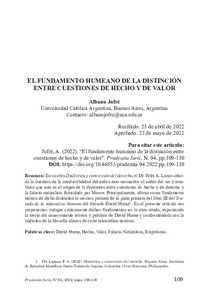Por favor, use este identificador para citar o enlazar este ítem:
https://repositorio.uca.edu.ar/handle/123456789/15660| Título: | El fundamento humeano de la distinción entre cuestiones de hecho y de valor The humean foundation of the distinction between questions of fact and value Il fondamento humiano della distinzione tra questioni di fatto e di valore |
Autor: | Jofré, Albano | Palabras clave: | Hume, David, 1711-1776; HECHO JURIDICO; VALOR; FALACIA; EMPIRISMO; NATURALISMO | Fecha de publicación: | 2022 | Editorial: | Pontificia Universidad Católica Argentina. Facultad de Derecho | Cita: | Jofré, A. El fundamento humeano de la distinción entre cuestiones de hecho y de valor [en línea]. Prudentia Iuris. 2022, 94. doi: 10.46553/prudentia.94.2022.pp.109-130. Disponible en: https://repositorio.uca.edu.ar/handle/123456789/15660 | Resumen: | Resumen: En su obra Dialéctica y concreción del derecho, el Dr. Félix A. Lamas aborda la cuestión de la irreductibilidad del orden axio-normativo al orden del ser y establece que este es el origen de la distinción entre cuestiones de hecho y de derecho y la falacia naturalista formulada por Moore. Principalmente, afirma como fundamento teórico de dicha distinción la sección primera de la parte primera del libro III del Tratado de la naturaleza humana del filósofo David Hume1. En el presente artículo nos proponemos indagar críticamente dichos fundamentos en la obra citada, exponiendo la teoría del conocimiento teórico y práctico de David Hume y confrontándola con la tradición de la filosofía clásica de corte aristotélico-tomista. Abstract: In his latest work, Dr. Félix A. Lamas addresses the issue of the gap between the is order and the ought order and states that this is the fundament for the distinction between matters of fact and of right and the naturalistic fallacy formulated by Moore2. Mainly, he says that the theoretical bases of these distinctions can be found in the first section of the first part of the book III of the Treatise of Human Nature by David Hume. On the present article we pretend to explore in a critical way those bases by exposing Hume’s theory of practical and theoretical knowledge and confronting it with the tradition of classical Aristotelian-Thomist philosophy. Sommario: Nella sua opera Dialettica e concretezza del diritto, il dott. Félix A. Lamas affronta la questione dell’irriducibilità dell’ordine assio-normativo all’ordine dell’essere e stabilisce che questa è l’origine della distinzione tra questioni di fatto e di diritto e l’errore naturalistico formulato da Moore. Principalmente, afferma come base teorica per questa distinzione la prima sezione della prima parte del libro III del Trattato sulla natura umana del filósofo David Hume. In questo articolo intendiamo indagare criticamente questi fondamenti nell’opera citata, esponendo la teoria della conoscenza teorica e pratica di David Hume e confrontandola con la tradizione della filosofia classica della corte aristotelico-tomista. |
URI: | https://repositorio.uca.edu.ar/handle/123456789/15660 | ISSN: | 2524-9525 (online) 0326-2774 (impreso) |
Disciplina: | DERECHO | DOI: | 10.46553/prudentia.94.2022.pp.109-130 | Derechos: | Acceso abierto | Fuente: | Prudentia Iuris. 2022, 94 |
| Appears in Collections: | PI - 2022 nro. 94 |
Files in This Item:
| File | Description | Size | Format | |
|---|---|---|---|---|
| fundamento-humeano-distinción.pdf | 312,54 kB | Adobe PDF |  View/Open |
Page view(s)
81
checked on Apr 27, 2024
Download(s)
82
checked on Apr 27, 2024
Google ScholarTM
Check
Altmetric
Altmetric
This item is licensed under a Creative Commons License

